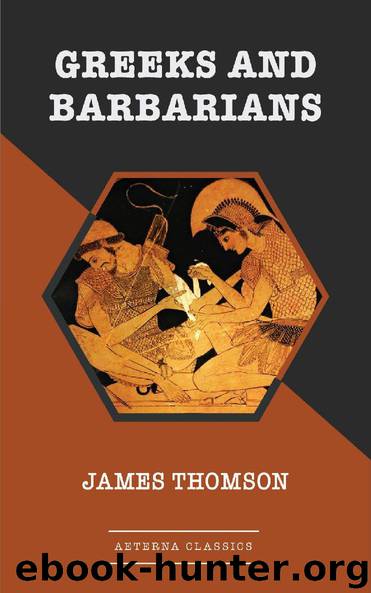Greeks and Barbarians by James Thomson

Author:James Thomson [Thomson, James]
Language: eng
Format: epub
Publisher: Aeterna Classics
Published: 0101-01-01T00:00:00+00:00
* * *
VI
GODS AND TITANS
It was an ancient hypothesis that the Gods are only deified men. A certain Euêmeros suggested this. His favourite illustration was Zeus; that greatest of the Gods, he said, was a prehistoric king in Crete, as the Cretan legends about him proved. This theory has received a fresh life from the investigations of modern scholars. Historically, it seems to be largely true; psychologically, it explains nothing at all. All men have need of the Gods, says Homer; the religious instinct, that is the important thing, or rather (since the other is important too) that is the fundamental thing. It is also the prior thing, the spring of the religious act. If I want to know why primitive men make a god of one of their number, it seems no answer to assure me that they do so. Yet the historical inquiry has great interest too, and throws a dim and rather lurid light on the development of religion and religious thought. And I could not leave untouched an aspect of the old Greek life so vital as its belief about the gods without illustrating how here also the conflict of Greek and Barbarian worked itself out.
It is almost the other day that we rediscovered the old Aegean religion—the immemorially ancient religion of the non-Greek peoples, the Barbarians, who lived about the Aegean Sea. It is now clear that the Hittites, the Phrygians, the ancient peoples of Anatolia generally, worshipped a kind of triad or trinity of Father, Son and Consort. Sometimes, as in the Hittite sculptures, the Father and the Son seem the important members of the group; sometimes, as in the Phrygian religion, the emphasis is chiefly on the Mother and Consort, and the Son. But the third member can always be discovered too, standing pretty obviously in the background. In prehistoric Crete (which, of course, became Greek in historical times) we again recognize the divine Three in the persons of those native divinities whom the Greeks learned to call Kronos, Rhea and Zeus. That is the skeleton of the old religion; the living flesh in which it was clothed was begotten in tribal custom. Primitive peoples fashion their gods after their own image. Their chief god they think of as a greater and more worshipful “king,” swayed by the passions, observing the etiquette, and wearing the regalia of their earthly rulers. Now the primitive king held his place by force or craft or the terror of his rages (his menos )—and by no other tenure. He lived in constant dread of the rival who, younger and stronger, would one day rise against him and seize his throne. The rival might be a stranger, but more frequently he was the king’s own son, who, for one thing, would be thought likely to inherit the magical virtue of his sire. Accordingly, when the Young King was born, the Old King would seek his life. But there he would be apt to meet the opposition of the Queen, who would seek to convey the child to a safe retreat.
Download
This site does not store any files on its server. We only index and link to content provided by other sites. Please contact the content providers to delete copyright contents if any and email us, we'll remove relevant links or contents immediately.
| Africa | Americas |
| Arctic & Antarctica | Asia |
| Australia & Oceania | Europe |
| Middle East | Russia |
| United States | World |
| Ancient Civilizations | Military |
| Historical Study & Educational Resources |
Room 212 by Kate Stewart(5094)
The Crown by Robert Lacey(4793)
Endurance: Shackleton's Incredible Voyage by Alfred Lansing(4746)
The Iron Duke by The Iron Duke(4340)
The Rape of Nanking by Iris Chang(4191)
Joan of Arc by Mary Gordon(4083)
Killing England by Bill O'Reilly(3987)
Say Nothing by Patrick Radden Keefe(3966)
I'll Give You the Sun by Jandy Nelson(3421)
Shadow of Night by Deborah Harkness(3344)
Hitler's Monsters by Eric Kurlander(3321)
Mary, Queen of Scots, and the Murder of Lord Darnley by Alison Weir(3192)
Blood and Sand by Alex Von Tunzelmann(3181)
Eleanor & Park by Rainbow Rowell(3143)
Darkest Hour by Anthony McCarten(3113)
Margaret Thatcher: The Autobiography by Thatcher Margaret(3069)
Book of Life by Deborah Harkness(2914)
Red Famine: Stalin's War on Ukraine by Anne Applebaum(2912)
The One Memory of Flora Banks by Emily Barr(2850)
